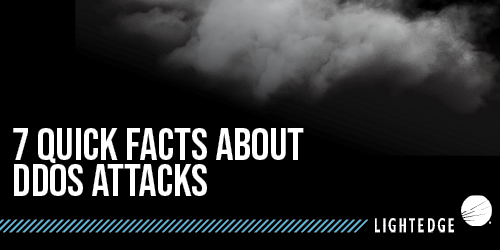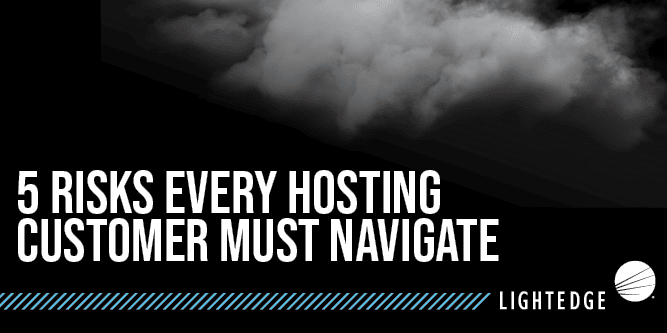How to Manage Risk in the Cloud
April 30, 2020

Lightedge
Author

Cloud providers have the potential to offer state-of-the-art cloud ecosystems that are resilient and secure. Far more secure than the environments of businesses who manage their own systems.
Prior to the coronavirus pandemic, many enterprises were probably considering, or were on their way to migrate workloads into the cloud. Now that IT has refocused their attention from ensuring secure work from home environments back to their daily responsibilities, it may be time for the cloud.
In fact, with entire organizations working remotely, there is no better time to pursue cloud services. The pivot to working from home highlights the benefits of cloud-based services that can quickly scale up defenses around decentralized employees.
Federal officials have warned in recent weeks of an uptick in threats related to the new coronavirus, from phishing emails to ransomware. That has left businesses using existing security tools to fend off attackers and keep workers online, experts say.
To combat these threats, we are seeing an increase in tools like Virtual Private Networks (VPNs). But that short-term spending to keep workforces up and running will likely veer toward the cloud as the economy recovers and executives plan for a more remote-friendly future, said Shaul Eyal, a communications and infrastructure software analyst at investment bank Oppenheimer & Co.
Cloud-based services, like all technology, are exposed to threats that can have adverse effects on organizational operations. Malicious entities can exploit both known and unknown vulnerabilities to compromise the confidentiality, integrity, or availability of the information being processed, stored, or transmitted by those systems. Thankfully there are ways to manage risk in the cloud.
Benefits of Cloud Services
If you are searching for an easy button to the cloud, you won’t find one. Any provider that says there is, are lying. But just because migrating to the cloud is a complex project, does not mean that it is not worth it. In fact, there are so many benefits.
Cloud allows you to set up what is essentially a virtual office to give you the flexibility of connecting to your business anywhere and at any time. This benefit alone is extremely valuable as most of the United States is under a shelter in place orders.
Before the pandemic, Gartner Inc. analysts projected that the market for cloud- and software-based security tools would grow by 17 percent during 2020. Moving technology, security and other teams off-site could tilt budget-conscious companies’ overall spending further toward the cloud, said Paul Proctor, a Gartner cybersecurity analyst.
Other cloud benefits include a reduction in IT costs. Many are feeling the financial pressure to save money and cut costs. Cloud could be the answer. In addition to flexibility and cost containment, cloud also provides increased scalability.
Teams are experiencing drastic increases or decreases in business depending on their industry, so having cloud services that can scale alongside your business is important. Another important aspect is business continuity. Whether you are experiencing a natural disaster, security threat, or global pandemic, having your data stored in the cloud ensures it is backed up and protected in a secure and safe location. Being able to access your data quickly allows you to conduct business as usual, minimize downtime and loss of productivity.
Managing Risk in the Cloud
With any technology, there are risks. Cloud services are not immune to them and to manage risk in the cloud, you must first identify them.
Enterprises planning to move to cloud-based IT systems need to first think how they have secured data on servers, and then implement procedures on how to protect data, control and manage its access in the cloud.
A study by IT industry association CompTIA found that even though many organizations are concerned about the security of their data in the cloud, only a small portion of companies perform a comprehensive review of their cloud service providers before sealing the deal.
As some businesses are betting on remote work arrangements enduring even after the current restrictions end, the time is now to start addressing those risk. In fact, around 74 percent of businesses plan to permanently keep more employees out of physical offices after the pandemic, according to a Gartner survey of 317 finance executives.
We are here to help you better manage any threats that your enterprise may face in the cloud. That way, your employees will continue to work safely even in a remote environment.
Risks in the Cloud
Prior to settling on a cloud service, you need to analyze the risk associated with the adoption of a cloud-based solution for a particular information system, and plan for the risk treatment control activities associated with the cloud-based operations of this system.
There are many types of risks organizations may face in the cloud including:
- Compliance violations
- Malware infections and data breaches
- Diminished customer trust and potential revenue loss
- Lack of uptime
- Increased complexity on IT staff
Consumers of cloud must understand the division of responsibilities and trust that their cloud service provider meets.
How to Manage Risk
To effectively manage risk in the cloud, the following high-level elements must be implemented. First, assign risk management responsibilities to leaders who are involved in the migration of workloads to the cloud. Then, establish cloud environment-wide tolerance for risk and communicate it through a Service Level Agreement (SLA), including the information on decision making activities that impact the risk tolerance.
Cloud services requires real-time monitoring, recognition, and understanding by an expert to assess security risks that arising from cloud usage.
When vetting cloud services providers be sure to find one that can carry the compliance burden. Every industry has different standards of compliance and security they aim to meet or are required to by auditors. Despite these differences, compliance standards like SOC reports help to provide an overarching framework for meeting different standards.
Cloud hosting providers that comply with specific industry standards are the providers that demonstrate an adherence to industry best practices and standards. If you are not controlled by strict industry compliance regulations, then certifications may not determine which cloud service and provider is right for your business.
Yet, it can be helpful when creating a shortlist of potential providers. As the scope of businesses impacted by compliance standards grows, your requirements may be changing. It’s nice to be prepared to meet the most stringent of standards to ensure your data and that of your clients is in the best hands.
The assumption that more workers will stay at home after the crisis could also pressure security companies to focus more on their cloud-specific offerings, said Matthew Hedberg, a software analyst at Royal Bank of Canada’s capital markets unit.
Test, Test, Test
Test, test, test. You will never regret being overly prepared for an emergency, so do not put off testing for failure. Cloud outages can be caused by external malicious attacks, insider threats, or even a simple system update. Test and plan for everything because most of the time an outage can be prevented.
Testing for failure can include everything from testing the viability of a response plan to a storage migration process. Quickly acting and responding to an incident makes a huge impact.
The cloud is a great place to test for failures because it is a staged environment. Organizations can replicate their systems in a staged layout to test production and analyze how it will perform in different situations.
It is also a good plan to verbally walk through the company’s recovery plan to build confidence in those who must carry out the plan.
Lightedge is Your Go-To Partner for Cloud Services
Lightedge is working with tons of organizations like yours to deliver predictable and contained costs to alleviate this stress. We’ve actually seen such a drastic impact in pricing that we’re setting up calls to perform a free Reduced Cost Estimate showing you exactly how much we could save you right away.
Our goal is to cut your costs right away and get you on a predictable model you never have to worry about again. The reliable availability of business IT is essential to the management and livelihood of every company, large or small. All elements hinge on the dependability of your technology to deliver vital information right when you need it.
When asked about our differentiators against the competition, one of the first answers is always – our network. Our history with network goes all the way back to 1996 when we were founded as an ISP. We spent over two decades making sure our network and infrastructure were scalable, redundant, and secure enough to meet the most challenging IT needs.
Lightedge’s highly trained compliance and network security experts take the guesswork out of keeping your business protected. Lightedge’s top priorities include compliance and network security to guarantee that our customer’s data is protected. Lightedge is compliant with:
Have you heard enough? Get in touch with us today to learn how we can save you money immediately. During this global pandemic, saving money where is matters is crucial to the survival of a business.
We have empowered hundreds of organizations across the nation through cost containment, security, and reliability. We are ready to do the same for yours.
Related Posts:
- What Is Cloud Repatriation And When Does it Make Sense?
- The Impact of COVID-19 And How CSPs Can Help
- Business Continuity Checklist: 8 Boxes To Check During COVID-19
- What is Edge Computing and How Does It Impact Me?
- The Five Pillars of a Secure Cloud Transformation for Regulated SaaS
- Challenges Healthcare Faces In The Public Cloud
- Microsoft Hikes The Price For Taking Its On-Premises Licenses To AWS and Google
- Seven Ways Digital Leaders Can Tackle Cloud Modernization
- PCI DSS Cloud Compliance: Your Guide To A Smooth Cloud Migration


